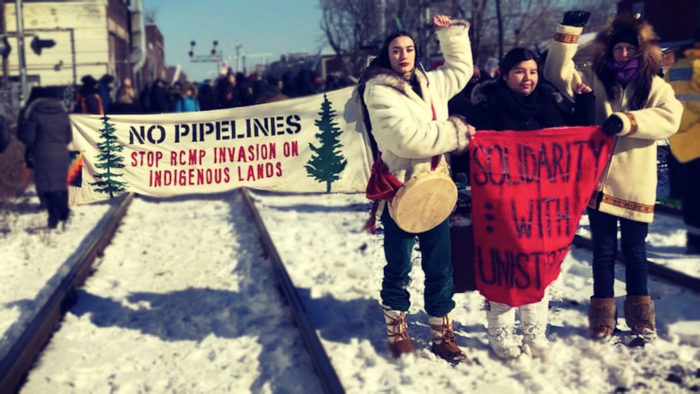
Update: Since the publication of this article the RCMP federal Canadian police have offered to withdraw from Wet’suwet’en territory as a condition to negotiate the end of the railroad blockades. This is not a victory but a significant step showing that the blockades have forced the Canadian state to back down. Direct Action Gets the Goods!
By Frank Ascaso and Arthur Pye
There is a path out of the climate crisis and the recent uprising and train blockades across Canada are showing the way.
Earlier this month, in a series of militarized police raids, Wet’suwet’en chiefs and other indigenous activists were forcibly removed from their own land at gunpoint in order to clear a path for the Coastal GasLink pipeline. Immediately, people across Canada started blockading ministerial buildings, freeways, ports and railroads in solidarity with the Wet’suwet’en. Nearly the entire Canadian passenger rail service has been shut down as a result of ongoing blockades by Mohawk and Gitxsan nations. These disruptive protests are costing industry billions of dollars, and leading to a major national crisis for the Trudeau government.
The uprising provides major lessons for movements for climate survival. First, that militant mass movements can quickly flip the balance of power, even when all hope seems lost. Next, direct action that does serious economic harm is a major tool that can help empower movements. And third, never, ever trust a politician, even left and liberal politicians that claim they support the environment and indigenous sovereignty.
Never Say Die
The Wet’suwet’en people have been fighting to stop Coastal GasLink’s liquid natural gas (LNG) pipeline project through their territories for years, but video of the RCMP arresting matriarchs and pointing high powered rifles at indigenous peoples sparked a national uprising which no one saw coming. Within a week, the Trudeau administration sent top-level officials to negotiate with indigenous leaders. While many feared recent court rulings represented a definitive defeat for pipeline opponents, this development has offered a new hope – not only for the fight against Coastal GasLink, but also for the fight against the Trans Mountain Pipeline Expansion, which recently received approval in the Canadian federal courts. No one knows how these fights will shake out in the future, but recent actions have clearly demonstrated the power of militant mass movements to alter the course of history.
Hit ‘Em Where it Hurts
The power of these protests comes from their mass participation, and their disruptive tactics that target companies and the government with concrete economic harm. Significantly, members of the Mohawk nation (a community with a history of militant resistance) have taken action in their own territory, blockading rail lines in Ontario that service the entire country. Additional blockades are happening in Quebec and British Columbia too, shutting down ports as well as a major rail bridge between Canada and the United States. The Minister of Indigenous Services, Marc Miller, told the CBC that “All of Canada is hurting, the economy is slowing down,” as a result of the protests. Conservative commentator Stephen LeDrew took it even further, complaining: “This is not protest, this is insurrection.” Demonstrations have even spread to the United States with actions in Washington State blocking rail lines in solidarity. It’s never been clearer that strategic direct action on a mass scale can bring a country to its knees, forcing those in power to listen.
/https://www.thestar.com/content/dam/thestar/news/canada/2020/01/06/as-sequel-to-wetsuweten-pipeline-showdown-looms-does-bcs-un-pledge-point-the-way-forward/photo_8.jpg)
Politicians Lie
While the right-wing parties in Canada want the government to use more force against the demonstrators, the Canadian left and liberal parties are not much better. The candidates who ran as environmental advocates and indigenous allies are the same ones who are now enforcing the raids, and police attacks against people trying to defend their territory against projects that will be devastating for the planet. Prime Minister Justin Trudeau, leader of the Liberal party, is facing pressure from the business press and business community to get the rail lines open and the economy functioning again. He justifies the pipeline projects by saying rather ludicrously that the projects will fund green energy development for the country. Trudeau called an emergency meeting of his cabinet, and after announced the desire for a “swift and peaceful” resolution. The premier of British Columbia, John Horgan (a left-leaning social democratic party leader) has also spoken out against the protests, in this case against activists who blocked the legislative assembly in Victoria. Despite their campaign promises, these politicians are not allies to movements. They will always do what’s politically expedient for them, and it’s up to movements to change that calculus.
Where Do We Go From Here?
The youth and indigenous people fighting for the future of the planet are the real leadership of Canada. As a 17-year-old Ojibwa-Metis activist recently told the Globe and Mail: “It’s our future that is going to be destroyed”. The next step is to take these disruptive tactics and turn them into long term organizing so the disruptions can be sustained. Right now, the Canadian government’s likely strategy is to wait for the demonstrations to fade. We must show that we have powerful movements that will not stand down, that we will fight until these pipeline projects are reversed, until indigenous peoples have their autonomy respected, and we secure a livable planet. This is up to us. This is our time. The solution to the climate crisis is before us.
Frank Ascaso and Arthur Pye are members of Black Rose/Rosa Negra in Seattle, WA and this article originally appeared at the On Power blog.
If you enjoyed this article listen to Arthur Pye on the Green New Deal and climate issues here, “Green Power: Strong Movements to Face the Climate Crisis.” Or read Mark Bray’s piece “No Time for Patience: Fascism, Climate, and Capitalism.”
